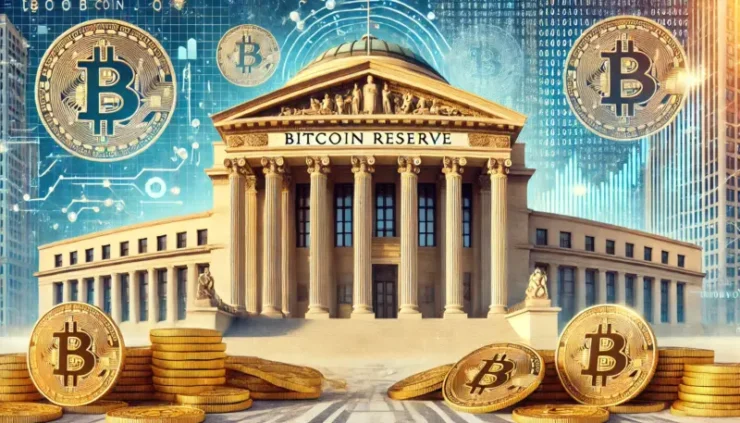Michael Saylor, executive chairman of MicroStrategy and one of the most influential proponents of cryptocurrency adoption, has argued for the United States to exclusively adopt Bitcoin as its strategic crypto reserve asset.
Speaking Wednesday on Fox Business Network’s “The Claman Countdown,” Saylor emphasized Bitcoin’s unique neutrality and unmatched foundational status within the crypto economy, asserting that no other digital asset currently holds equivalent strategic value for the U.S. government.
The U.S. government currently holds approximately 200,000 Bitcoin, valued at roughly $17 billion. Saylor, whose company owns nearly 2.4% of Bitcoin’s total supply, described Bitcoin as “property in cyberspace,” uniquely designed to serve as a secure store of wealth, given its decentralized nature and lack of any single issuer. Unlike traditional fiat currencies or even other cryptocurrencies, Bitcoin’s value proposition hinges significantly on its decentralized structure, making it resistant to centralized manipulation.
According to Saylor, Bitcoin’s decentralized character positions it as a neutral financial asset suitable for a strategic reserve.
“Bitcoin is the one universally agreed upon foundational asset in the entire crypto economy because it’s the asset without an issuer, It’s neutral.”
said Saylor, who pointed out that “99% of the energy and the capital” in the crypto market flows into Bitcoin due to these inherent properties. He emphasized that a Bitcoin reserve represents more than mere financial strategy—it signifies staking a claim in digital territory.
Securing America’s Place in Cyberspace
Framing Bitcoin as “digital land,” Saylor advocated for swift governmental action, warning that hesitation could allow other nations to dominate the rapidly growing digital financial sector. He suggested that adopting Bitcoin reserves now would ensure U.S. economic leadership against competitive global powers such as China, Russia, and European nations, all of which are reportedly exploring or already creating similar strategic reserves.
“If you get there first, before the foreigners, before the Europeans, the Africans, the South Americans, the Russians and the Chinese, the U.S. can own it and benefit from it.”
Saylor asserted. He cited insights from industry expert David Bailey, who noted China’s active but largely undisclosed efforts to establish its own strategic Bitcoin reserve.
The strategic acquisition of Bitcoin would enhance America’s financial sovereignty, according to Saylor. He highlighted warnings from Tyler Winklevoss, co-founder of the cryptocurrency exchange Gemini, who argued that delaying the stockpiling of Bitcoin might lead to higher costs, reduced geopolitical influence, and diminished financial sovereignty.
Why Bitcoin, Not XRP Or Other Cryptocurrencies?
While recognizing the roles of other digital assets, such as stablecoins and tokenized securities, Saylor drew a clear line differentiating Bitcoin from assets like Ripple’s XRP or platforms such as Solana and Cardano. He emphasized that Bitcoin alone possesses characteristics necessary for strategic reserve holdings, describing other cryptocurrencies as fundamentally different in nature and function.
Addressing Ripple’s XRP specifically, Saylor characterized it as “a digital token,” noting that although it provides significant utility and digital financial functions, it remains fundamentally distinct from Bitcoin. XRP, he explained, is a token issued by a centralized entity, making it unsuitable as a neutral reserve asset.
“Their role is capital creation for small and midsize companies blocked from capital markets right now,” He said.
By contrast, Bitcoin remains the only asset without an issuer, categorically qualifying as “digital property” suitable for a national strategic reserve.
Coinbase CEO Brian Armstrong, though open to other cryptocurrencies, echoed this view, stating Bitcoin’s proven reliability as a long-term store of value makes it the strongest candidate among digital assets for strategic reserves.
As policymakers consider an executive order addressing crypto reserves, Saylor urged regulatory clarity to distinguish between digital commodities (like Bitcoin), currencies, and securities. He called for a methodical and transparent national strategy for accumulating Bitcoin, enhancing the nation’s financial resilience and long-term economic strength.
As the White House prepares to host its Crypto Summit, featuring prominent voices including Saylor, Brian Armstrong, and David Bailey, Bitcoin’s future role in America’s strategic financial reserves could soon become a key policy decision impacting the country’s economic competitiveness.





